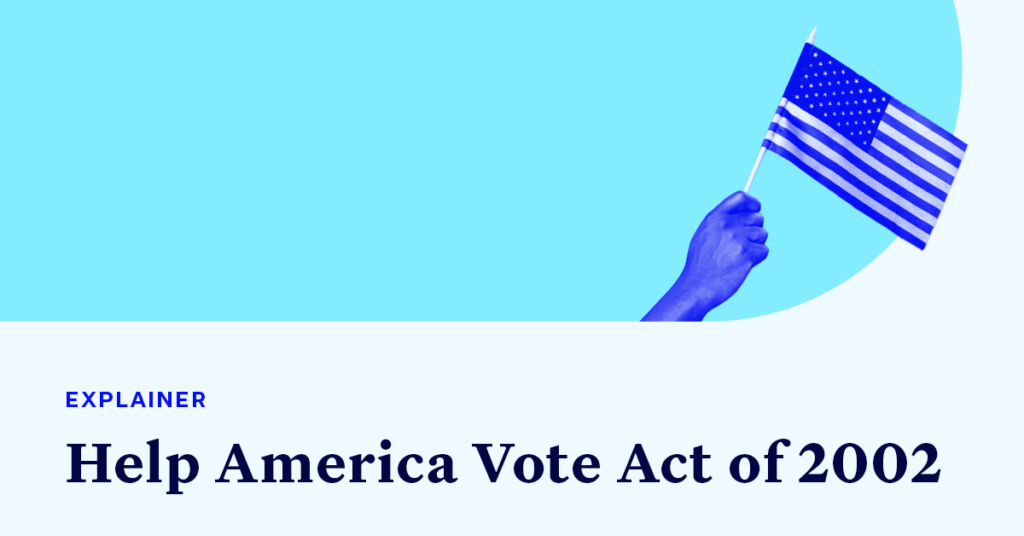How Congress Addressed the Issues of the 2000 Presidential Election

“The administration of elections is primarily a state and local responsibility. The fairness of all elections, however, is a national priority.”
These are the words of former President George W. Bush, speaking at the signing ceremony for the Help America Vote Act of 2002 (HAVA) on Oct. 29, 2002. The very election that installed Bush as president was marred with issues, spurring federal legislation in the years that followed. On the 20th anniversary of HAVA’s enactment, we’re explaining what HAVA did and how it is still used in litigation today.
HAVA was a direct response to election administration issues during the 2000 presidential election.
After voting disputes delayed the results for weeks, the close 2000 presidential election was ultimately decided by the U.S. Supreme Court. From punch card machines and “hanging chads” to infamously poor ballot design that may have cost former Vice President Al Gore the presidency, the administration of elections became uniquely salient in the nation’s psyche. In response, Congress drafted HAVA to standardize some aspects of election administration that had created problems in 2000.
After nearly a year of negotiations and compromise, the ultimate version of the bill passed both chambers with bipartisan support in October 2002 — the House voted 357-48 to pass the bill and the Senate voted 92-2 in favor. Bush signed HAVA into law several weeks later.
What does HAVA do?
HAVA has three main goals. The first focuses on funding jurisdictions across the country to improve their election management. Through a grantmaking program, HAVA authorized funding for general improvements, as well as incentivizing more specialized efforts, such as polling place accessibility, youth civic education, updates to voting equipment and poll worker recruitment. Notably, one of the funding priorities helped election offices replace punch cards and lever machines — two types of voting machines that caused major issues during the 2000 election.
In turn, HAVA’s investments led to a dramatic increase in the use of paperless electronic voting machines called direct recording electronic (DRE) machines. In more recent years, experts have concurred that paperless technology has too many vulnerabilities, so most paperless DREs have since been replaced with those that maintain a paper trail. Nonetheless, DREs have become the target of election conspiracy theories after the 2020 election, with a surge in efforts to ban these machines along with other technology that’s often improperly conflated with them.
The second HAVA prong created the Election Assistance Commission (EAC), the first federal agency dedicated to election administration, specifically the implementation of HAVA and its grant program. HAVA directs the EAC to test and certify voting equipment and maintain a national voter registration form. The EAC also administers a national clearinghouse to share election best practices and voluntary voting system guidelines.
Finally, HAVA created minimum standards for all states to comply with, an example of Congress exercising its authority to regulate federal elections. These requirements include:
- Creating provisional ballots as a safety net for voters for whose eligibility is unclear;
- Offering voters at the polls an opportunity to check and correct their ballots, and notifying voters about overvoting;
- Publicly posting certain voter information, such as polling place hours and sample ballots;
- Implementing and maintaining a centralized, statewide voter registration database;
- Requiring first-time voters to present ID at the polls if they register with a mail-in voter registration form and
- Providing at least one accessible, private voting system for persons with disabilities at each polling place.
Twenty years later, HAVA exemplifies Congress’ power to regulate elections and has been recently invoked in several lawsuits.
As with all federal statutes, the U.S. Department of Justice has the ability to enforce HAVA. Compared with other laws, such as the Voting Rights Act of 1965 or the National Voter Registration Act of 1993, there is noticeably less litigation around HAVA, but it does exist.
Just this month, the American Civil Liberties Union (ACLU) of Nevada filed a lawsuit against a Nevada county’s plan to, among other changes, limit the use of accessible voting equipment. The ACLU argued that this violated the standards in HAVA that outline accessible voting systems for voters with disabilities. In contrast to the ACLU’s efforts, recent fringe lawsuits sought to ban all electronic voting machines in Kansas and Oregon, erroneously invoking HAVA and arguing that the equipment used in 2020 was not properly accredited by the EAC.
In March 2020, Congress appropriated additional funding for HAVA emergency funds to “provide states with additional resources to protect the 2020 elections from the effects” of the COVID-19 pandemic. Outside of a handful of other specific instances, however, the federal government has not sustained an effort to support under-resourced election offices across the country. In a 2015 Brennan Center report, election infrastructure expert Lawrence Norden concluded that the “key challenge facing American elections as voting machines reach the end of their lifespans” is a lack of funding to maintain or replace them. “Congress made the down payment,” Norden continues, referring to HAVA, “but has shown no inclination to provide additional support more than a decade later, and few expect this to change anytime soon.” In 2022, this need is even more dire, as Republican lawmakers across the country are banning private funding for elections, a lifeline for under-resourced offices.
Twenty years on, HAVA represents the importance of dedicating the necessary resources to hold successful and secure elections and it also stands as a reminder that Congress can take federal action to protect voting rights and improve election administration.